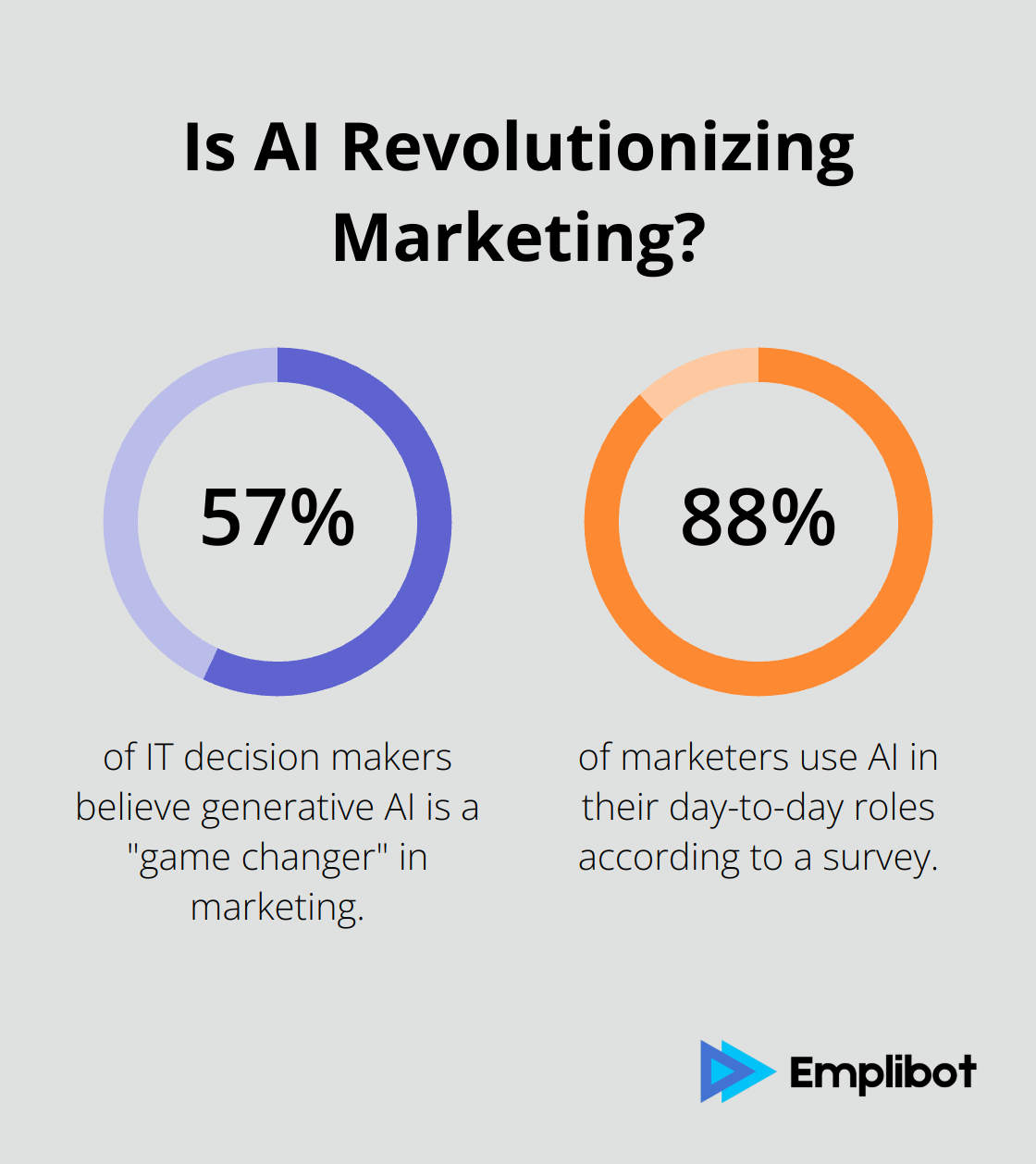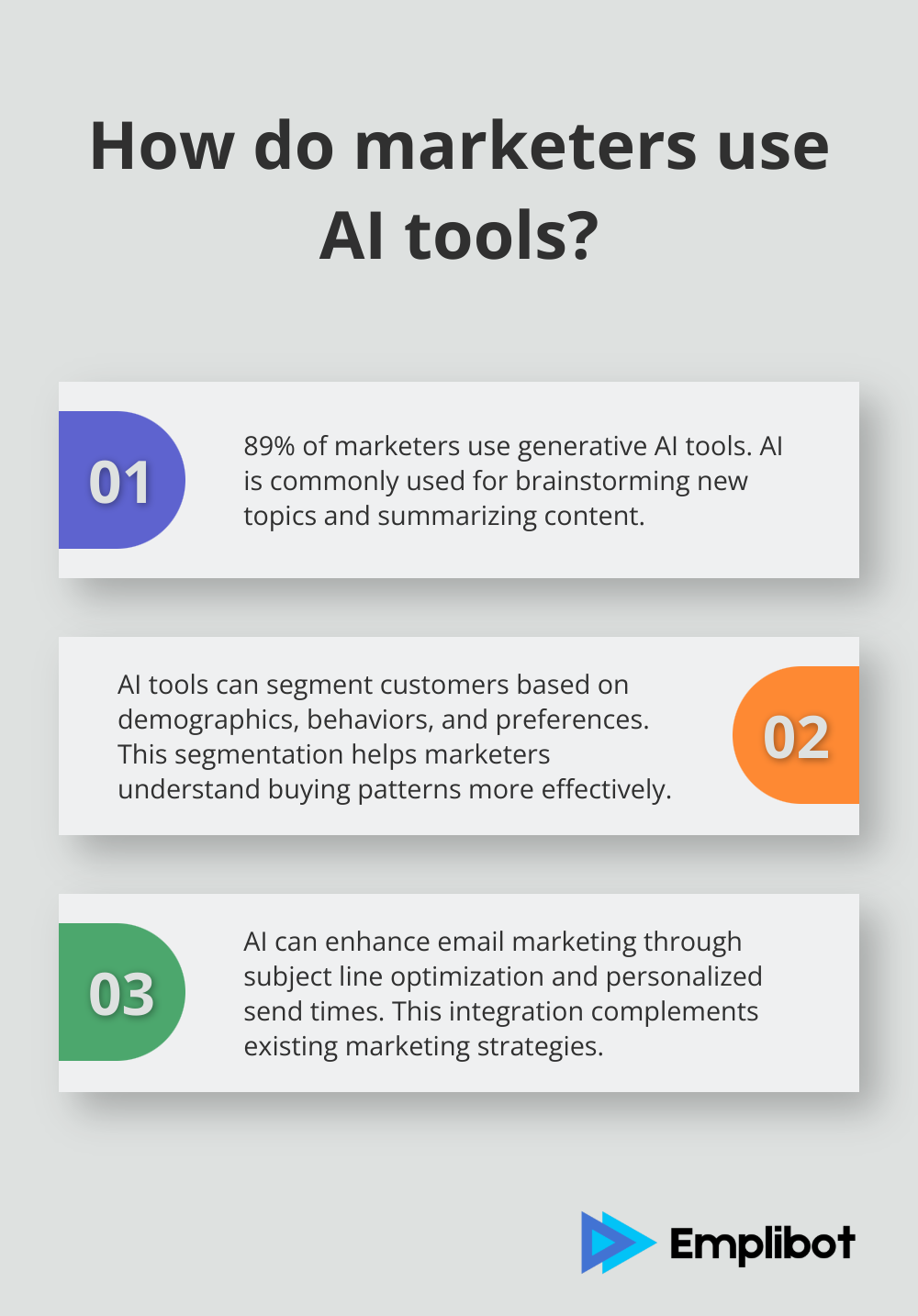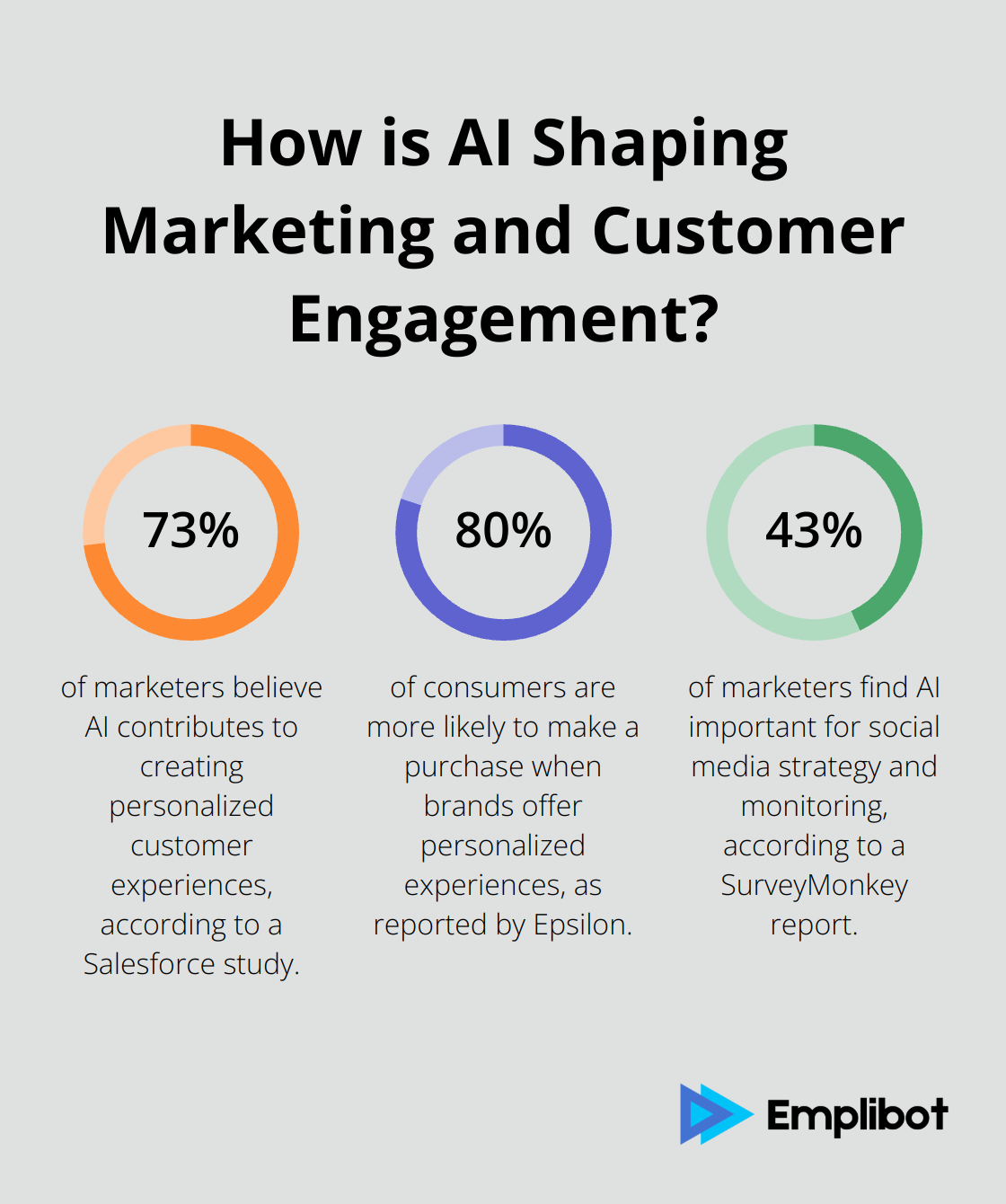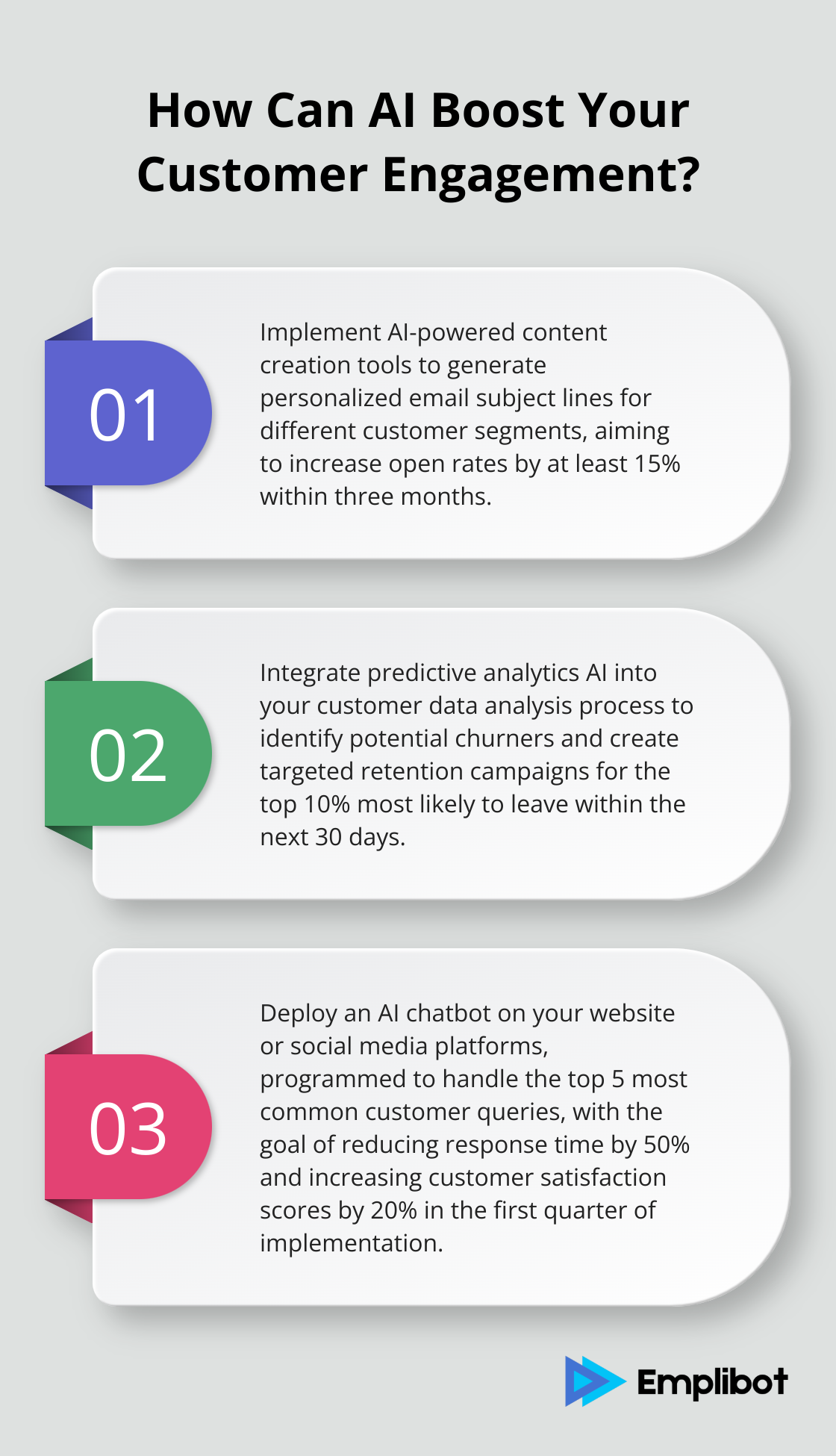AI marketing campaigns are revolutionizing how businesses connect with their audiences. At Emplibot, we’ve seen firsthand how these innovative strategies can boost engagement and drive results.
This blog post will guide you through creating an effective AI marketing campaign, from understanding the technology to implementing powerful tactics. Get ready to transform your marketing efforts and stay ahead of the competition.
What is AI Marketing?
AI marketing revolutionizes how businesses connect with their customers. It uses artificial intelligence technologies to make automated decisions based on data collection, analysis, and observations of audience or economic trends that impact marketing efforts.
The Power of AI in Marketing
AI in marketing isn’t just a buzzword-it’s a game-changer. A recent survey of 500 IT decision makers revealed that 57% believe generative AI is a “game changer.” This technology allows for unprecedented levels of personalization and efficiency in marketing campaigns.
Key AI Technologies Reshaping Marketing
Several AI technologies make waves in the marketing world:
- Machine learning algorithms analyze vast amounts of customer data to predict behaviors and preferences.
- Natural Language Processing (NLP) powers chatbots and voice assistants, enabling more natural customer interactions.
- Computer vision technology enhances image and video recognition, allowing for better visual content analysis and targeting.
Tangible Benefits of AI-Powered Marketing
The benefits of incorporating AI into marketing campaigns are substantial. AI streamlines content creation and distribution, saving businesses countless hours while maintaining high-quality output. According to a survey, 88% of marketers use AI in their day-to-day roles.

AI also excels at predictive analytics. It analyzes historical data to forecast future trends and customer behaviors with remarkable accuracy. This allows marketers to make data-driven decisions and allocate resources more effectively.
Overcoming Implementation Challenges
While the benefits are clear, implementing AI in marketing presents challenges. This is where user-friendly AI solutions (like Emplibot) come in, offering powerful tools that don’t require extensive technical knowledge.
As we move forward, we’ll explore how to design and implement an AI marketing strategy that leverages these powerful technologies to drive real results for your business. The next section will guide you through the process of creating a solid foundation for your AI-powered marketing efforts.
How to Design Your AI Marketing Strategy
Define Clear Marketing Objectives
Set specific, measurable objectives for your AI marketing campaign. These objectives should align with your overall business strategy. For example, you might set a goal to increase website traffic by 30% in six months or boost conversion rates by 15% in a quarter. Specific, time-bound goals will help you measure the success of your AI initiatives.
Analyze Your Target Audience
AI thrives on data, so collect as much information about your target audience as possible. Use AI-powered analytics tools to segment your customers based on demographics, behaviors, and preferences. These tools can assist in customer segmentation by using data patterns that tell a more nuanced story of who is buying what.
Select Appropriate AI Tools
Choose AI tools that align with your specific marketing needs. If you focus on content creation, AI writing assistants can prove invaluable. For customer service, AI-powered chatbots might be your go-to solution. Eighty-nine percent of marketers say they use generative AI tools, with many using AI to brainstorm new topics and summarize content.
Integrate AI with Existing Marketing Efforts
Integrating AI with your existing marketing efforts enhances your current processes. Identify areas where AI can provide the most significant impact. For example, if email marketing is a strong channel for your business, implement AI for subject line optimization and send time personalization. This approach ensures that AI complements and amplifies your existing strategies rather than replacing them entirely.

The next step in creating an effective AI marketing campaign involves implementing specific AI-powered tactics. We’ll explore how to leverage AI for personalized content creation, predictive analytics, and more in the following section.
How to Implement AI-Powered Marketing Tactics
Personalized Content Creation at Scale
AI transforms content creation, allowing marketers to produce personalized content at an unprecedented scale. A Salesforce study reveals that 73% of marketers believe AI contributes to creating personalized customer experiences. This personalization is important, as Epsilon reports that 80% of consumers are more likely to make a purchase when brands offer personalized experiences.

To leverage AI for content creation, use tools that analyze your audience data and generate tailored content ideas. These tools can help you craft compelling headlines, blog posts, and social media updates that resonate with your specific audience segments. You might use AI to create different versions of an email subject line for various customer groups (increasing open rates and engagement).
Predictive Analytics for Customer Behavior
Predictive analytics helps understand and anticipate customer behavior. By analyzing historical data, AI can forecast future trends and customer actions with remarkable accuracy. This insight allows you to proactively tailor your marketing efforts and stay ahead of the curve.
Implement predictive analytics by integrating AI tools that analyze customer data from various touchpoints. These tools can help you identify which customers are most likely to churn, what products they might be interested in next, or when they’re most likely to make a purchase. With this information, you can create targeted campaigns that address customer needs before they even arise.
Chatbots and Conversational Marketing
AI-powered chatbots revolutionize customer service and marketing. Marketing’s core activities are understanding customer needs, matching them to products and services, and persuading people to buy-capabilities that AI can enhance. A SurveyMonkey report indicates that 43% of marketers find AI important for social media strategy and monitoring (which includes the use of chatbots).
To implement chatbots effectively, identify the most common customer queries and interactions. Use this information to train your chatbot to handle these scenarios efficiently. As your chatbot interacts with more customers, it will learn and improve its responses, providing an increasingly seamless experience.
AI-Driven Email Marketing Optimization
Email remains a vital marketing channel, and AI can significantly enhance its effectiveness. AI tools can optimize everything from subject lines to send times, dramatically improving open rates and conversions.
Implement AI in your email marketing by using tools that analyze your subscriber data to determine the best time to send emails to each individual. These tools can also help you craft personalized subject lines and content based on each subscriber’s preferences and behavior. The result? Higher engagement rates and more effective email campaigns.
Dynamic Pricing and Product Recommendations
AI excels at analyzing market conditions and customer behavior to optimize pricing strategies and product recommendations. This capability allows you to maximize revenue while providing customers with relevant product suggestions.
To implement dynamic pricing, use AI tools that analyze factors such as demand, competitor pricing, and customer behavior to adjust your prices in real-time. For product recommendations, implement AI algorithms that analyze customer browsing and purchase history to suggest relevant products. Amazon’s conversions average 2.17% when someone visits the site, but if a visitor runs a search, the conversion rate increases significantly.
Final Thoughts
AI marketing campaigns have become essential for businesses to maintain a competitive edge. These campaigns unlock unprecedented levels of personalization, efficiency, and insight. Marketers who leverage AI technologies can create more engaging and effective campaigns that resonate with their audience.

The future of marketing will see AI play an even more significant role. Emerging trends like voice search optimization and augmented reality experiences will further transform how businesses connect with their audiences. Marketers who embrace these innovations will position themselves to create more impactful campaigns.
Emplibot offers a comprehensive solution that automates content marketing efforts from keyword research to distribution. This AI-powered tool allows businesses to create high-quality, engaging content at scale (freeing up valuable time and resources). The combination of AI power with human insight will drive real business results in future marketing campaigns.

